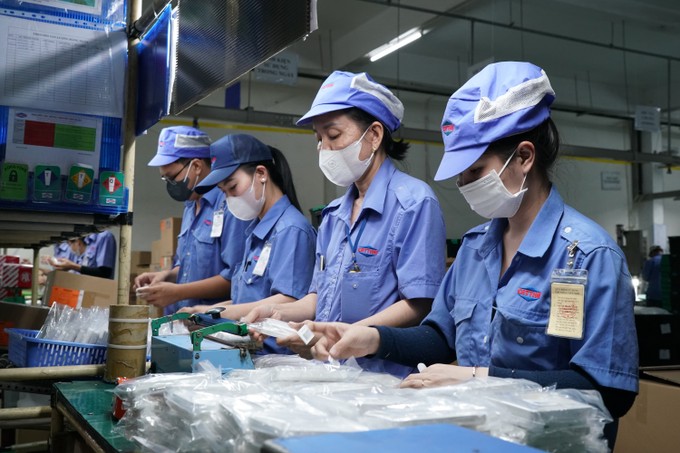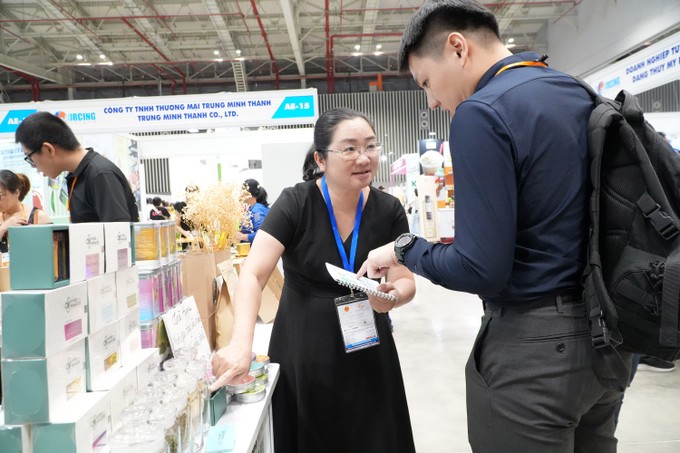Positive export growth: A bright spot for export businesses
Overall, in the first six months of the year, the country's export turnover recorded positive growth, reaching over US$190 billion.

However, according to the Ministry of Industry and Trade, to achieve the growth target of 6 percent compared to last year, many coordinated solutions need to be implemented.
Orders recover
According to Mr. Vu Ba Phu, Director of the Trade Promotion Agency under the MoIT, the country's monthly export turnover has shown positive growth compared to the same period in 2023 over the past six months. In total, export turnover in the first half of 2024 reached $190.08 billion, an increase of 14.5 percent compared to the same period last year.
To achieve these results, the MoIT implemented multiple parallel solutions domestically and internationally. Domestically, key efforts included collaborating with local authorities to organize regional export promotion events in Lao Cai, Hanoi, Dak Lak, and Ho Chi Minh City. Local authorities and relevant agencies directly addressed and resolved export bottlenecks for specific industry groups and individual businesses. This included resolving issues related to increased logistics costs, a shortage of transport ships, and delivery times to minimize impacts on the shipping schedules agreed upon by businesses. Additionally, businesses were supported in improving product quality to meet the technical standards of import markets.
Additionally, in foreign markets, Vietnamese trade offices regularly update businesses on market trends and support them in connecting with partners to expand markets and minimize risks during the export process. Recently, the MoIT has coordinated with Vietnamese trade offices in major export markets such as the United States, Europe, China, and ASEAN to proactively organize numerous trade promotion activities in traditional markets like China, the EU, and the United States, as well as new markets like Eastern Europe and Central Asia. These activities have attracted participation from up to 2,000 businesses, facilitating connections with partners and the signing of contracts. Through connections with overseas trade offices, products from Vietnam's key export sectors have maintained a presence at significant global trade events.
Support for market exploitation
The bright spots in the export market have become quite evident, with many businesses adapting, changing strategies, and seeking new markets such as South Korea, Japan, China, and Southeast Asia to offset declines in traditional markets. However, there are still many challenges facing exports.

Mr. Nguyen Phuoc Hung, Vice Chairman of the Ho Chi Minh City Union of Business Association, noted that political risks have contributed to shrinking global consumer demand, leading to mixed results across different sectors. For instance, the food processing sector, which has favorable market conditions, achieved nearly $3 billion in export turnover in the first half of the year, up nearly 70 percent compared to the same period last year. In contrast, products, such as beverages, machinery, electrical equipment, and paper are experiencing high inventory levels, indicating a downward trend in overall demand in the coming months.
Mr. Nguyen Anh Duc, Chairman of the Vietnam Retailers Association, mentioned that the significant increase in low-cost consumer goods from other countries has created substantial pressure on Vietnamese businesses. Additionally, businesses are facing a significant challenge due to the doubling of sea freight costs. The freight rate for a 40-foot container to Europe has risen from over $2,000 to $5,000. This situation has put businesses at risk of increasing export turnover while still suffering revenue losses.
In response to these challenges, many businesses have urged for solutions to address the risk of cash flow shortages to support exports. Despite the government and the State Bank of Vietnam issuing several support policies, some have shown limit ed effectiveness. For instance, Resolution No. 43/2022/QH14, which offers a 2 percent annual interest rate support for selected sectors and enterprises, has only disbursed around VND1.22 trillion to date, equivalent to about 3.05 percent of the total policy scale until the end of 2023.
Moreover, the government should establish mechanisms and policies to develop and attract capital from alternative financial products, such as real estate investment and housing savings funds, and other channels, including foreign direct and indirect investments.
"To sustain export growth in the face of continuing complexities in the global economy, the MoIT is intensifying efforts to collaborate with potential export markets, tailor access policies, and create favorable conditions for businesses," emphasized Mr. Vu Ba Phu. "In the coming time, businesses and local authorities should proactively share information on supply orders and sample products with overseas trade offices to actively engage with partners with matching demands."
On July 4, the MoIT announced Vietnam's import-export results for the first half of 2024, with a total trade turnover estimated at $368.53 billion, marking a 15.7 percent increase over the same period last year. Specifically, exports grew by 14.5 percent while imports rose by 17 percent. The trade surplus reached $11.63 billion. Deputy Minister Phan Thi Thang of the MoIT attributed these positive outcomes to the global market recovery, which has led to increased export orders, thereby boosting overall trade activities in the first half of 2024.
On the same day, over 200 experts and business representatives participated in the conference "Current Foreign Trade Transactions: Shifts in Business Strategies and Dispute Management," organized by the Ho Chi Minh City Investment and Trade Promotion Center (ITPC) in collaboration with the Vietnam International Arbitration Center (VIAC). At the conference, Mr. Nguyen Huu Nam, Deputy Director of the Vietnam Chamber of Commerce and Industry's Ho Chi Minh City Branch, emphasized the importance for businesses to minimize legal risks in import-export activities. He highlighted the need for firms to thoroughly understand the nature and characteristics of international trade contracts, including the legal frameworks governing these contracts and potential risks related to politics or culture. Businesses were encouraged to review and assess the capabilities of contracting parties, transaction conditions, and local legal regulations to proactively address any risks that may arise during contract execution.








